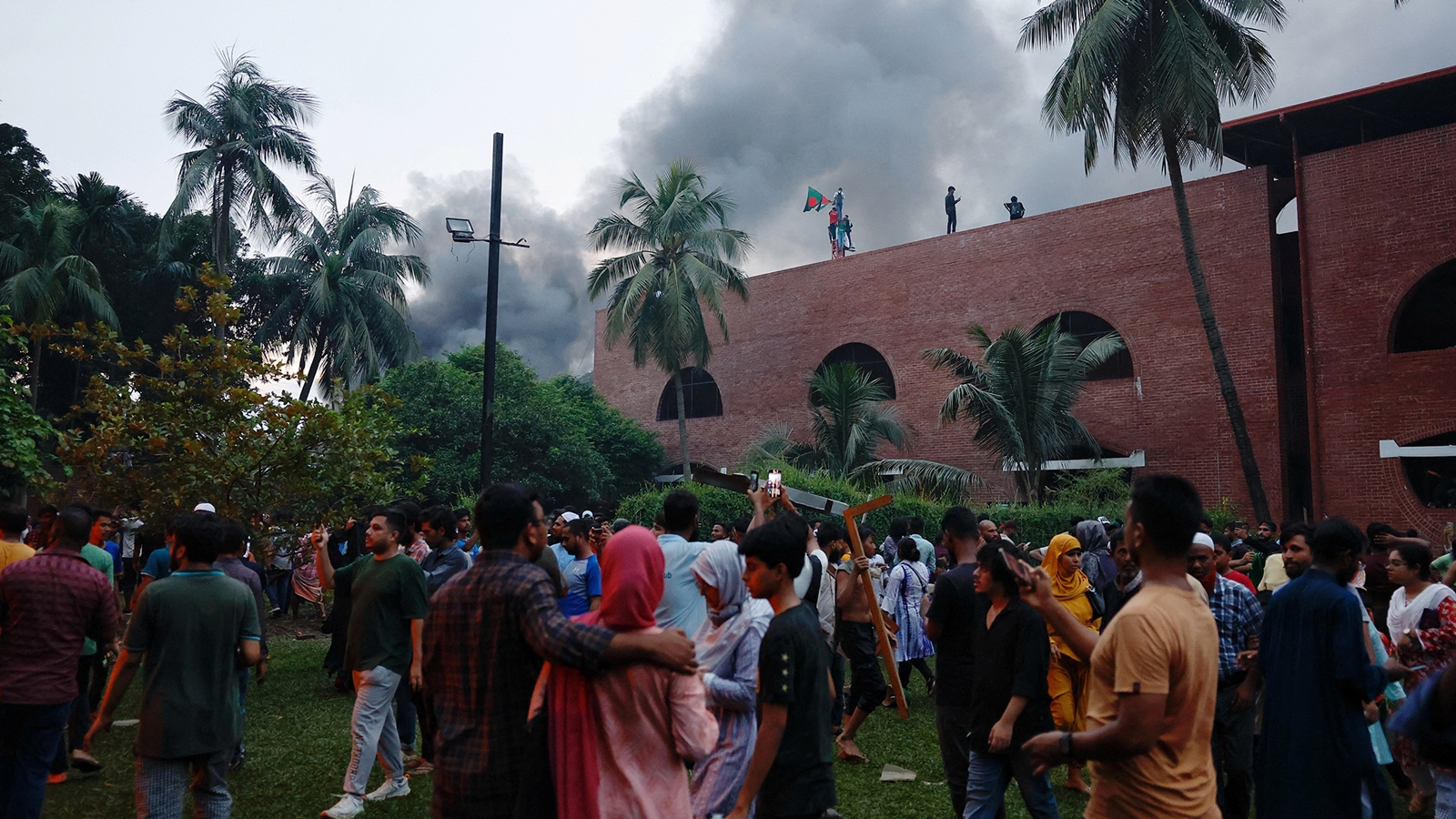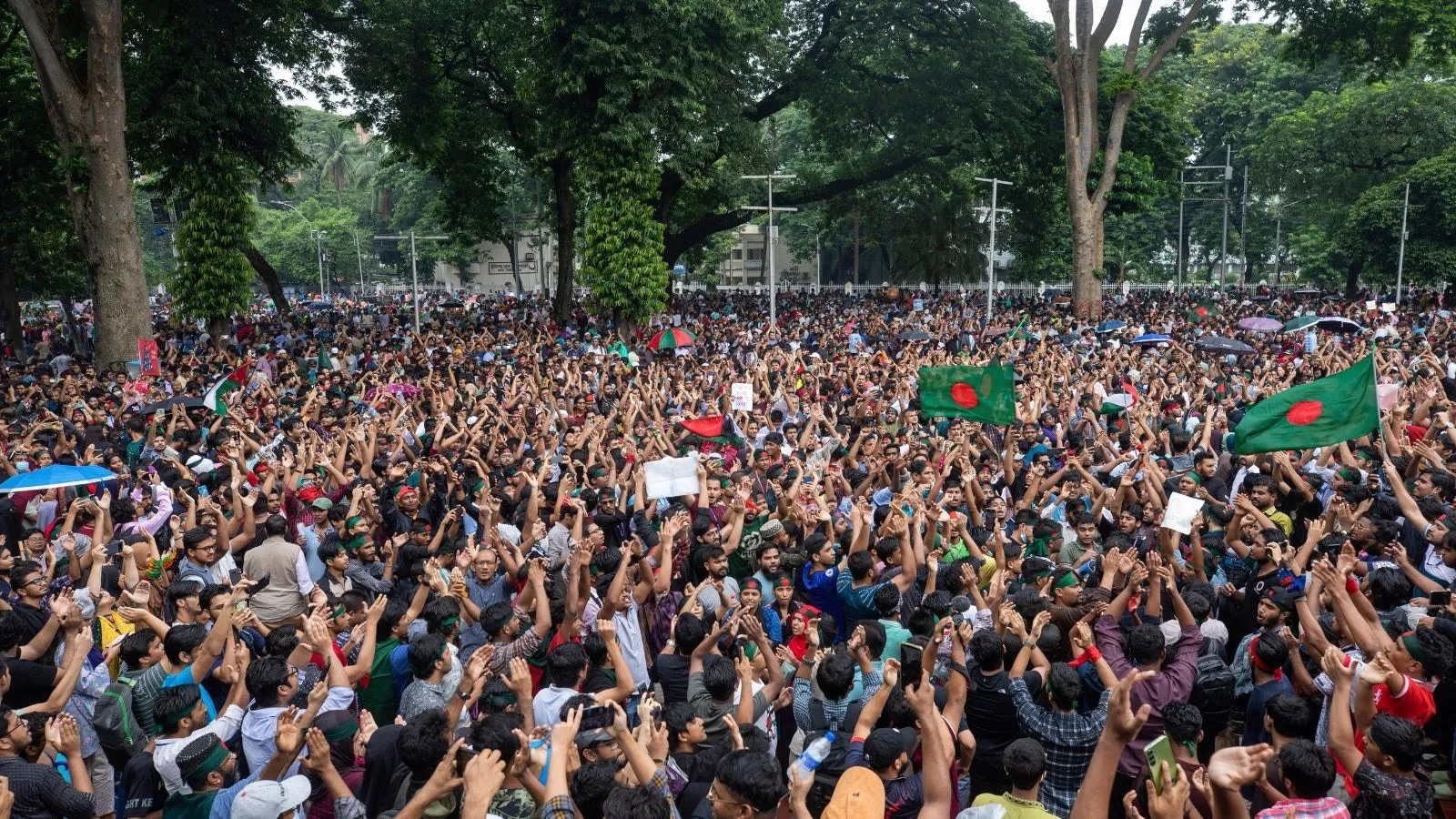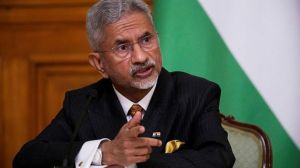Hours after she resigned as Bangladesh Prime Minister and fled the country, Sheikh Hasina landed in India — at the Hindon airbase in Ghaziabad — on Monday evening, where she met National Security Advisor Ajit Doval. Sources said she was taken to a “safe house”, and is likely to travel to the United Kingdom (UK).
Hasina’s unceremonious exit and the turmoil on Dhaka streets has got India worried and concerned that the popular anger against her may also singe Delhi, seen as a trusted ally and supporter of the Awami League.

On Monday night, Prime Minister Narendra Modi chaired a meeting of the Cabinet Committee on Security (CCS) and took stock of the situation in Bangladesh. Home Minister Amit Shah, Defence Minister Rajnath Singh, External Affairs Minister S Jaishankar, Finance Minister Nirmala Sitharaman and senior officials of intelligence agencies were among those present.
Story continues below this ad
 Smoke rising from Ganabhaban, the PM’s residence, which was stormed by public shortly after Hasina’s resignation. (Reuters)
Smoke rising from Ganabhaban, the PM’s residence, which was stormed by public shortly after Hasina’s resignation. (Reuters)
Jaishankar also briefed Modi on the situation, and apprised Leader of Opposition in Lok Sabha Rahul Gandhi on the developments in the neighbouring country.
While Hasina, accompanied by her sister, landed at the Hindon airbase, near Delhi, on Monday evening, sources said she is likely to travel to the UK. “At around 5.15 pm, Hasina landed at the Hindon airbase in a C-130J military transport aircraft of the Bangladesh Air Force. During her interaction with Doval, senior military officials and officials of the intelligence agencies were also present,” said sources.
A source in the security establishment said she was taken to a “safe house”. A PTI report said Hasina is likely to meet her daughter Saima Wazed, who is based in Delhi. Wazed is working as the World Health Organisation’s regional director for South-East Asia.
 Protesters celebrate beside a defaced portrait of Prime Minister Sheikh Hasina after news of her resignation, in Dhaka, Bangladesh. (AP)
Protesters celebrate beside a defaced portrait of Prime Minister Sheikh Hasina after news of her resignation, in Dhaka, Bangladesh. (AP)
“Two planes of the Indian Air Force left for Assam from Hindon airbase and another from Lucknow to transport security personnel to secure border areas,” said the source.
Story continues below this ad
According to sources, top government officials also held meetings with the Armed Forces on Monday evening to plan evacuation efforts. It is learnt that the Indian Air Force (IAF) has been roped in to evacuate Indians stuck in Bangladesh, including high commission officials, and the effort is likely to begin Tuesday.
On Monday, a wary South Block watched scenes of protesters ransacking Hasina’s office and residence, entering Parliament, attacking the ruling Awami League’s party offices, and even vandalising the statue of Mujibur Rahman. New Delhi has stepped up security of Indian diplomatic facilities in Bangladesh but the concerns spread far beyond the immediate.
 Demonstrators toss a trash bin during an anti-immigration protest, in Rotherham, Britain. (Reuters/File)
Demonstrators toss a trash bin during an anti-immigration protest, in Rotherham, Britain. (Reuters/File)
Since she returned to power in 2008, Hasina’s presence next door has been a friendly and assuring one for New Delhi as both countries cooperated on the issue of counter-terrorism and cracked down on anti-India terrorist outfits operating from Bangladesh soil.
This made her an important ally in the fight against extremism — both New Delhi and Dhaka were on the same page when it came to dealing with the Jamaat-e-Islami in Bangladesh. This, in turn, emboldened Hasina to go after the Opposition — starting with Jamaat, then rival BNP, and slowly and surely, cracking down on dissenting voices in civil society and the media.
Story continues below this ad
For more than 16 years now, India has backed Hasina — despite being questioned for her undemocratic ways when it came to dealing with the Opposition, civil society and the media. It has also given aid and assistance for infrastructure and humanitarian needs to meet Dhaka’s requirements.
In recent years, Hasina faced questions of rigging elections from the West — especially the US. But Delhi stood firm behind her. In the last one year, she visited India thrice — once in September last year for the G20 leaders’ summit and twice in June this year itself, the first time for PM Narendra Modi’s third-term swearing-in ceremony and then for a bilateral visit.
 People participate in a protest march against Prime Minister Sheikh Hasina and her government, demanding justice for the victims killed in the recent countrywide deadly clashes, in Dhaka, Bangladesh. (AP)
People participate in a protest march against Prime Minister Sheikh Hasina and her government, demanding justice for the victims killed in the recent countrywide deadly clashes, in Dhaka, Bangladesh. (AP)
This reflected the proximity between the two countries, and the Indian government’s backing of Hasina even as she faced growing anti-incumbency and scrutiny on the domestic front. In the last month or so, as she battled with the protesters and students, she went by her political instincts and framed them as being propped by the Opposition, especially the Jamaat. She used her old playbook of going after the Opposition — using the state machinery — and crushing dissent; firing at protesters; clamping down on the internet; and shutting down the city by imposing curfew.
This transformed a leaderless movement by the youth — aspirational, ambitious and angry at lack of opportunities and jobs — to a larger movement, backed by the political Opposition, who sensed an opportunity in a system where the Opposition has been squeezed out. As the casualty hovered between 200 and 300 people, the anger on the streets could no longer be contained and protesters started asking for her head.
Story continues below this ad
This was seen by Delhi as a “complete mishandling” of the students’ protest even as India made no statements of endorsement or distancing. By merely saying that “it is an internal matter of Bangladesh”, it focused on bringing its citizens out of Bangladesh to safety. Last month, about 4,500 Indians were brought back.
With Hasina’s departure, New Delhi fears the possibility of “anti-India elements” gaining strength, possibly re-defining Dhaka’s new power structures. All of Delhi’s eggs were in the Awami League basket and not many lines from here reached the Opposition parties, like the BNP and Jamaat.
This will pose a challenge if these parties are in the driver’s seat in the corridors of power. What will work to India’s advantage is its engagement with the Bangladesh security establishment due to their joint cooperation against terrorism and extremism — from the Bangladesh military, to intelligence agencies, police and law-enforcement agencies to their border guarding forces. New Delhi will hope to use these levers, along with some robust ties with civil society, to manage the blowback from the Opposition in Bangladesh.


 Smoke rising from Ganabhaban, the PM’s residence, which was stormed by public shortly after Hasina’s resignation. (Reuters)
Smoke rising from Ganabhaban, the PM’s residence, which was stormed by public shortly after Hasina’s resignation. (Reuters) Protesters celebrate beside a defaced portrait of Prime Minister
Protesters celebrate beside a defaced portrait of Prime Minister  Demonstrators toss a trash bin during an anti-immigration protest, in Rotherham, Britain. (Reuters/File)
Demonstrators toss a trash bin during an anti-immigration protest, in Rotherham, Britain. (Reuters/File) People participate in a protest march against Prime Minister Sheikh Hasina and her government, demanding justice for the victims killed in the recent countrywide deadly clashes, in Dhaka, Bangladesh. (AP)
People participate in a protest march against Prime Minister Sheikh Hasina and her government, demanding justice for the victims killed in the recent countrywide deadly clashes, in Dhaka, Bangladesh. (AP)







